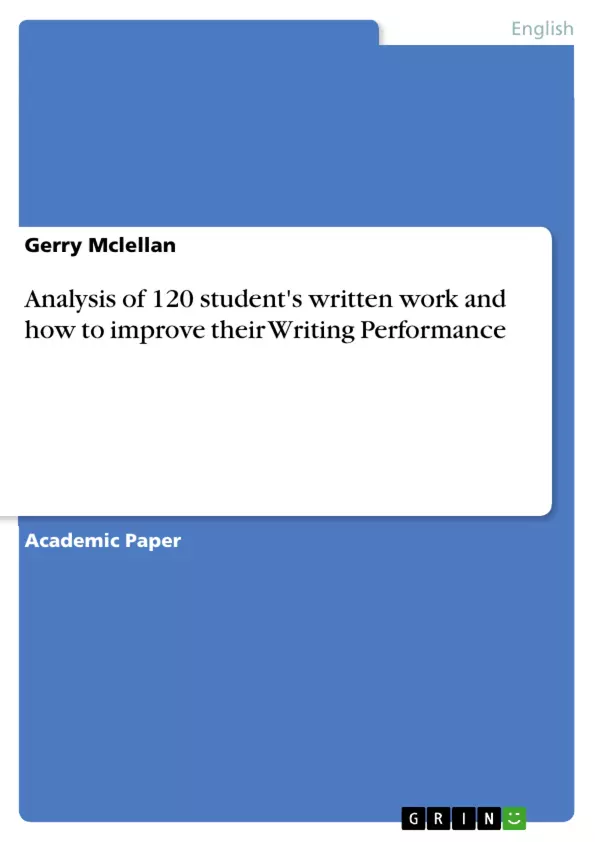Recent developments in EIKEN and TEAP testing in Japan try to ensure that students can write to a suitable standard and express their thoughts concisely whilst making use of correct academic conventions. However, as many teachers are aware, a large percentage of their university students are incapable of writing even the most fundamental sentences, despite having studied the language for six years. Indeed, large numbers of students wishing to attend universities in the UK and other overseas countries find it difficult to convey meaning accurately in English. They face similar problems with content and structure. This paper examines how three classes, one of 35 students and two of 34 students, at one university were assessed on their written ability and demonstrate that, even with the most rudimentary instruction and feedback, many were able to increase their writing performance significantly. I write this paper before the onset of a more detailed active research project I hope to conduct and feel confident that the initial findings substantiate further research into this field. Additionally, I am collaborating with a colleague to develop assessment software for the educational sector. In the following paragraphs I will discuss the methodology and reasoning behind the research project before discussing the findings. I teach English at a number of institutes from junior high schools to universities and I have always wondered how I might be able to help or encourage my students to improve upon their writing skills. Since I also grade written work for EIKEN pre-first examinees and TEAP examinees as well as deliver seminars on correct EAP conventions, I noticed that a large number of students make similar and repetitive mistakes in their written work. At the time of writing, I am collaborating with a colleague to develop assessment software for the EFL market and I wanted to test the appropriateness of this software on a number of students, receive their feedback and suggestions and make any necessary alterations to the planned software design before making an investment.
Inhaltsverzeichnis (Table of Contents)
- Abstract
- Introduction
- Method
- Participants
- Procedure
- Results
- Discussion
- Conclusion
- References
- Appendix
Zielsetzung und Themenschwerpunkte (Objectives and Key Themes)
The paper aims to evaluate the impact of providing detailed feedback on students’ writing skills. The author utilizes a method of action research and examines data from three university classes to assess how students respond to feedback and whether their writing skills improve.
- The effectiveness of feedback in enhancing student writing abilities.
- Exploring the limitations of traditional assessment methods in Japanese education.
- The development of assessment software to promote real-time feedback and self-evaluation.
- The significance of formative assessment in promoting student learning.
- Examining the perceived benefits and challenges of receiving detailed feedback on written work.
Zusammenfassung der Kapitel (Chapter Summaries)
The "Abstract" section presents the background of the study, highlighting the challenges faced by Japanese students in writing in English. It introduces the author's motivation to conduct research and develop assessment software.
The "Introduction" section further elaborates on the author's observations regarding student writing difficulties and outlines the rationale behind developing assessment software. It discusses the potential benefits of formative assessment and the limitations of traditional assessment practices.
The "Method" section outlines the research methodology and participants involved in the study. It provides details on the three classes, their composition, and the procedure followed in conducting the action research.
Schlüsselwörter (Keywords)
The main keywords and focus topics of the text are action research, written analysis, timed-writing, quantitative findings, qualitative findings, formative assessment, assessment software, and Japanese education.
Frequently Asked Questions
What is the main problem Japanese university students face in English writing?
Despite years of study, many students struggle with fundamental sentence construction, academic conventions, and conveying meaning accurately.
How can detailed feedback improve student writing performance?
The research demonstrates that even rudimentary instruction and specific feedback can lead to significant increases in writing quality.
What role does assessment software play in this study?
The author is developing and testing software to provide real-time feedback and promote self-evaluation for EFL (English as a Foreign Language) students.
What is the difference between formative and traditional assessment?
Formative assessment focuses on ongoing feedback to promote learning, whereas traditional methods often rely on final grades without detailed guidance for improvement.
How many students were included in this research?
The study examined 103 students across three university classes (one class of 35 and two classes of 34).
- Citation du texte
- Gerry Mclellan (Auteur), 2018, Analysis of 120 student's written work and how to improve their Writing Performance, Munich, GRIN Verlag, https://www.grin.com/document/441757



